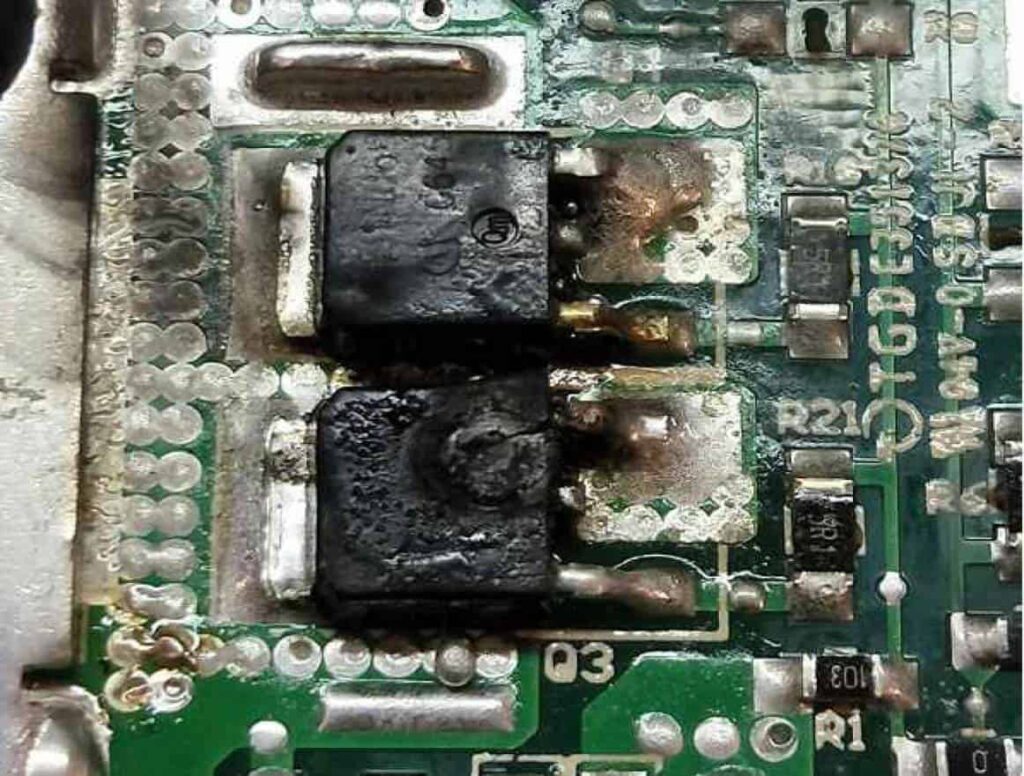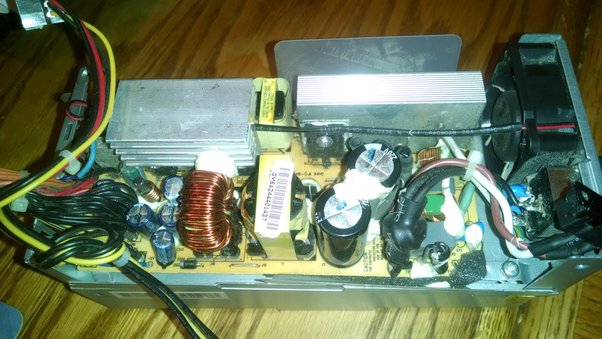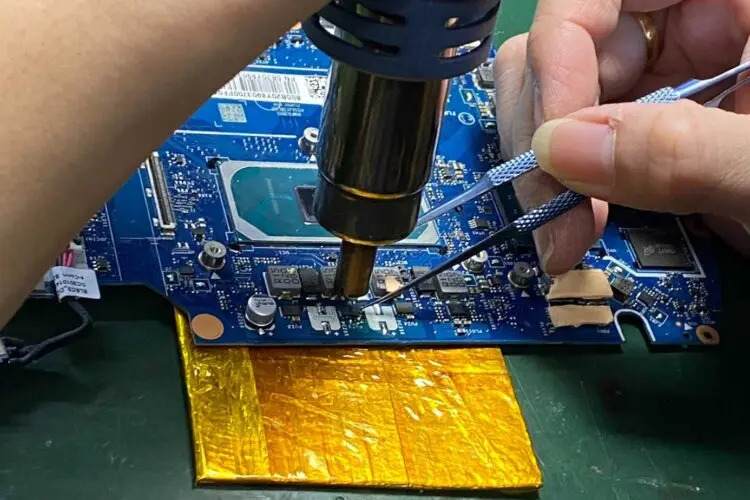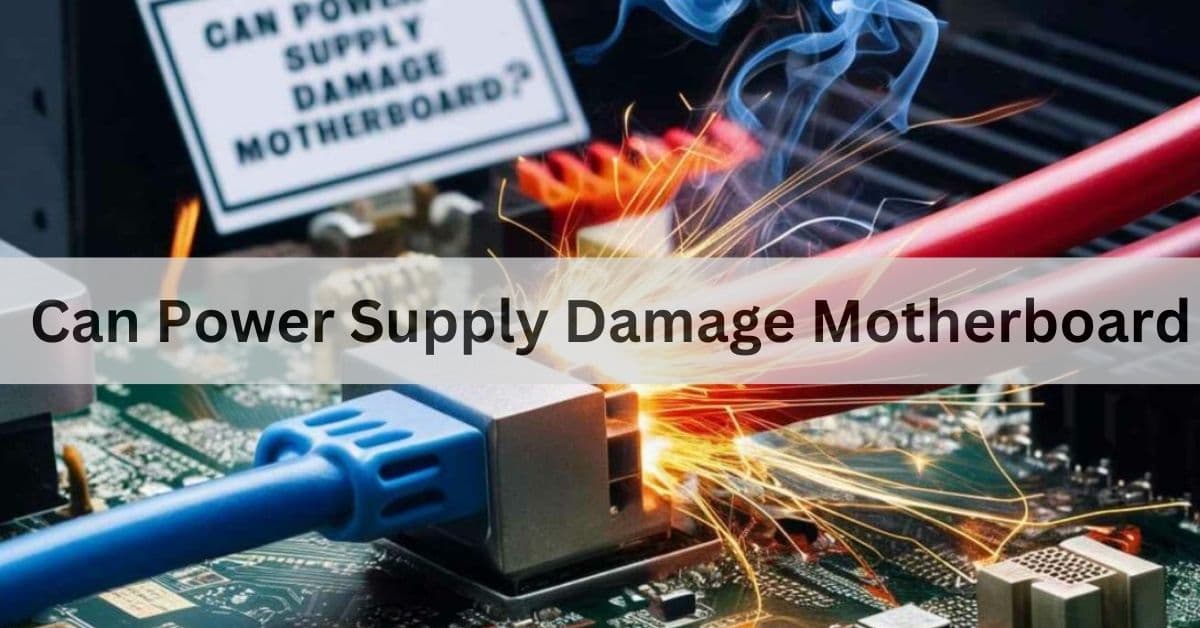I once faced motherboard damage due to a faulty power supply. After random shutdowns and errors, I realized the power supply was the issue. Choosing a reliable power supply is key to avoiding costly motherboard repairs!
Yes, a faulty power supply can damage a motherboard. If it sends too much voltage or has other issues, it may cause problems. Always use a good power supply to protect your motherboard and computer.
In this article, we will discuss “Can Power Supply Damage Motherboard”.
Table of Contents
Can a faulty power supply harm the motherboard?

Yes, a faulty power supply can harm the motherboard. It may cause random shutdowns, system errors, or even permanent damage. Using a good-quality power supply is important to protect your motherboard and keep your computer running smoothly.
Read More: New Motherboard Ethernet Not Working – Ultimate Guide – 2024!
Can a faulty power supply harm the motherboard?
Yes, a faulty power supply can harm the motherboard. It may send unstable power or surges, leading to damage. Using a reliable power supply helps protect your motherboard and keeps your computer running smoothly without unexpected problems.
How does power supply voltage affect motherboard safety?
Voltage Specifications:
Each motherboard has a specific voltage it needs to operate properly. Common voltages include +3.3V, +5V, and +12V. Using a power supply that delivers the wrong voltage can damage the motherboard.
Overvoltage Risks:
If the power supply sends too much voltage, it can overload the components on the motherboard. This can lead to overheating, burning out parts, or even causing the motherboard to stop working entirely.
Undervoltage Problems:
If the power supply does not provide enough voltage, the motherboard may not function properly. This can cause instability, random shutdowns, or failure to start up.
Power Supply Quality:
Not all power supplies are made the same. Cheap or low-quality power supplies may not deliver stable voltage. This can lead to fluctuations that harm the motherboard.
Can a power supply short out a motherboard?
Yes, a power supply can short out a motherboard. If the power supply fails or sends too much voltage, it can cause damage. This may lead to system failures, so using a good quality power supply is very important.
Can a bad power supply damage your computer?
Yes, a bad power supply can damage your computer. It can cause random shutdowns, error messages, or even hardware failure. Choosing a good power supply is important to keep your computer running well and avoid costly repairs.
How often should I replace my power supply to prevent motherboard issues?
Every 3 to 5 Years:
A good rule is to change your power supply every 3 to 5 years. This helps ensure it works well and reduces the chance of problems.
If You Hear Unusual Noises:
If your power supply starts making strange sounds, like buzzing or clicking, it may be time to replace it. These noises can signal that it is not working properly.
When Upgrading Other Parts:
If you upgrade your motherboard or other computer parts, consider getting a new power supply. Make sure it has enough power for the new components.
After a Power Surge:
If your area experiences a power surge or blackout, check your power supply. It may have been damaged and could harm your motherboard if not replaced.
Can a power strip fry a motherboard?
Yes, a power strip can fry a motherboard if it doesn’t have surge protection. A power surge or overload can damage the motherboard. It’s important to use a good quality power strip with surge protection to keep your computer safe.
How do I know if my motherboard or power supply is bad?
To check if your motherboard or power supply is bad, look for signs like random shutdowns, failure to power on, or strange noises. Test the power supply with a multimeter, and if problems persist, consider replacing the motherboard.
Are certain types of motherboards more vulnerable to power supply damage?
Quality of Components:
Motherboards made with lower-quality materials may not handle power fluctuations well. Cheaper parts can break easily when the power supply sends out unstable electricity.
Age of the Motherboard:
Older motherboards can be more sensitive to power issues. As they age, their parts may wear down, making them less able to cope with sudden changes in power.
Power Supply Compatibility:
Some motherboards require specific power supplies to work correctly. If the power supply doesn’t meet the motherboard’s needs, it can cause damage over time.
Overclocking Features:
Motherboards designed for overclocking often draw more power. If the power supply cannot provide enough energy, it can lead to overheating and potential damage to the motherboard.
What precautions can protect the motherboard from power supply damage?

To protect your motherboard from power supply damage, use a good quality power supply, check for proper connections, avoid overloading, and consider using a surge protector. Regular maintenance can also help ensure everything runs smoothly and safely.
Read More: Is My Motherboard Compatible With GPU – Quick Compatibility Guide!
Signs That Your Power Supply May Be Damaging Your Motherboard:
Signs that your power supply might be harming your motherboard include random shutdowns, unusual noises, or burning smells. If your computer won’t turn on or shows error messages, it’s important to check the power supply for problems.
Frequent System Crashes or Reboots:
Frequent system crashes or reboots can happen for many reasons, such as faulty hardware or software problems. It’s important to check your connections, update your drivers, and ensure your power supply is working well to avoid these issues.
Burning Smell or Visible Damage:
If you notice a burning smell or see visible damage on your motherboard, turn off your computer immediately. This could mean serious problems, and it’s best to have a professional check it to avoid further damage.
Unresponsive System or No Power:
If your system is unresponsive or has no power, check the power supply, cables, and connections. A faulty power supply may prevent the system from starting. Make sure everything is plugged in properly before seeking professional help.
Can a bad power supply kill a motherboard?
Yes, a bad power supply can kill a motherboard. If it sends too much or too little power, it can damage the motherboard’s components. Using a good power supply is important to protect your computer from serious issues.
Bad psu ruined motherboard?
Yes, a bad power supply unit (PSU) can ruin a motherboard. If the PSU sends too much voltage or has short circuits, it may cause serious damage. Always use a good-quality PSU to protect your motherboard from issues.
what could it have damaged?
A faulty power supply can damage the motherboard and connected parts, such as the CPU, RAM, and graphics card. This can lead to system failures, data loss, and costly repairs. Always use a good power supply to protect your computer.
Can a motherboard damage PSU?
Yes, a motherboard can damage a power supply unit (PSU) if there are electrical issues, like short circuits or component failures. This can cause the PSU to fail or not work properly, leading to system problems or shutdowns.
How fast can power supply damage motherboard?

A power supply can damage a motherboard quickly if it sends too much voltage or has a short circuit. This can cause sudden failures or permanent damage. Using a good quality power supply helps protect your motherboard from such problems.
Read More: Dram Light On Motherboard – The Ultimate Guide 2024!
FAQs:
1. Can a faulty power supply harm the motherboard?
Yes, a faulty power supply can send unstable voltage to the motherboard, potentially causing permanent damage to its components.
2. How does power supply voltage affect motherboard safety?
If the voltage is too high or too low, it can lead to overheating or underperformance. Motherboards are designed to work within a specific voltage range.
3. What precautions can protect the motherboard from power supply damage?
Using a good quality power supply, installing surge protectors, and ensuring proper ventilation can help protect the motherboard from power-related damage.
4. How can I test if my power supply is affecting my motherboard?
You can use a multimeter to check the voltage output of your power supply or monitor system stability during heavy use to spot any issues.
5. What role does power supply wattage play in motherboard safety?
A power supply with sufficient wattage ensures that all components receive enough power. Underpowered systems can lead to crashes and hardware damage.
Conclusion:
The power supply plays a vital role in protecting the motherboard. A faulty or low-quality power supply can cause significant damage, affecting overall system performance. To minimize risks, it’s essential to choose reliable components, ensure compatibility, and monitor system health regularly. By taking these precautions, users can help maintain a stable and safe computing experience.
